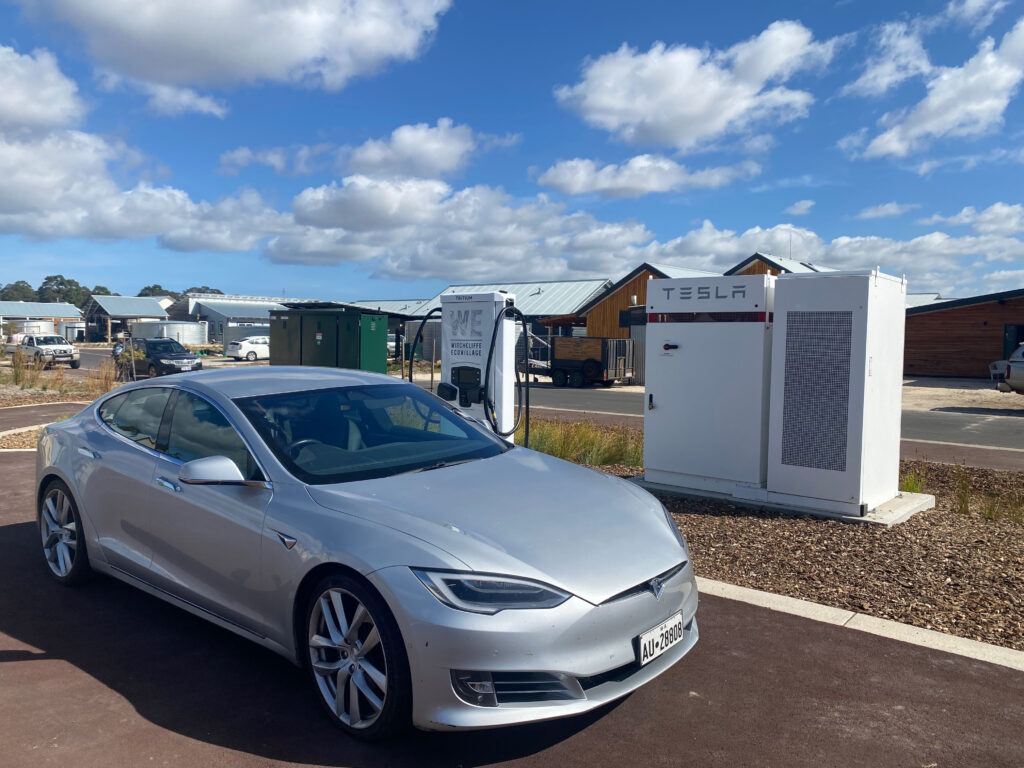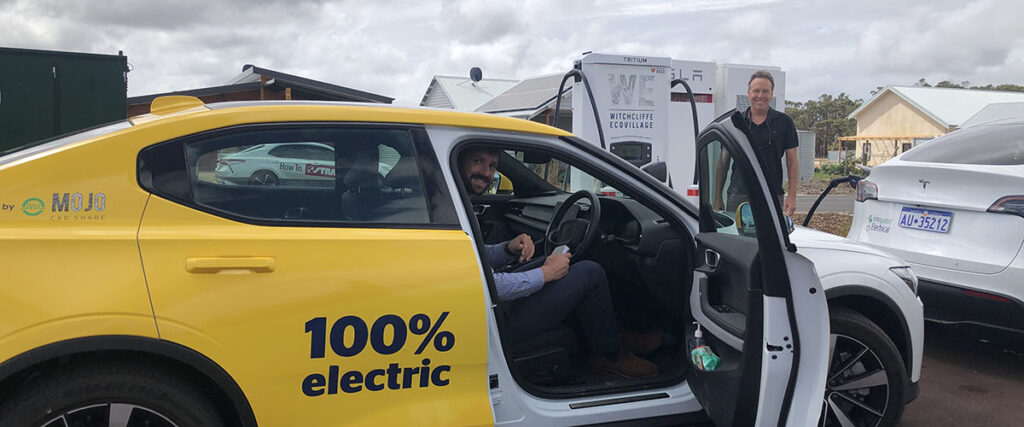EV use in the Ecovillage
It’s great to see several Ecovillage residents buying EVs, including Tesla Model 3, Hyundai Kona and a Peugeot e-2008.
As an early EV adopter, I have often been asked for my recommendation on the best EV to purchase at present. My first two questions are: what range do you need and what’s your budget? If it’s a second car, you probably only need a lower range vehicle, as it’s only a 20km round trip to Margaret River, or 100km return to Augusta or Busselton.
My first EV was a Nissan Leaf, eight years ago, which only had a range of around 140km. It was perfect for around town and was the most affordable entrance into EV ownership at the time, at $33,000.
However, once my confidence in the technology grew from owning the Leaf, the next logical step was to sell our main car, a diesel Toyota Prado, and buy a long-range EV, as I was having to drive to Perth and back regularly for meetings with various consultants, government authorities and my Ecovillage JV partners at the Perron Group.
I worked out that I had spent $38,000 on fuel in the Prado over 10 years, so if I purchased a Tesla with sufficient range and filled it using excess energy from our solar system at home and the office, I would be miles ahead when replacing the battery in 10 years’ time.
I have never looked back, the Tesla has been the best vehicle I have ever owned, by more than a million miles (they expect Tesla’s brushless electric motors to do 13 million miles). I’ve now done 104,000km in six years – that’s 104,000 zero CO2 and pollution emitting kilometres. However, the fact is this car was very expensive, which is often the case for early adopters, you wouldn’t believe me if I told you how much my first 2kW solar system cost 18 years ago.

However, running the vehicle has been almost zero cost as I use 100% solar power, and Teslas need almost zero servicing. All I’ve had to do is replace a 12V battery, a fuse, and tyres. The vehicle still has a range of 390km, so I anticipate that when I do replace the battery in another 3-5 years, I’ll be keeping the existing battery to convert my old Kombi ute to electric, with an anticipated range of around 250km. I can’t wait to convert the Kombi ute to electric, at which point I’ll be selling our Hilux ute
Having said all of this, you only need a long-range EV if you’re doing regular commutes to Perth. Ideally, in the long run, Ecovillage Commons Ltd (our not-for-profit common land ownership entity) could end up owning a long range EV for residents to use on the occasion they need to do a long distance trip, with each cluster ultimately owning a few much more affordable short range EVs, which would make EV ownership affordable and accessible to all. The best value mid-range EVs are still sitting in the mid to high $40,000 range, which is completely unaffordable for most people, especially with the recent increased costs of living and interest rates.
Imagine how much money we’d all save by sharing the costs of vehicle ownership, including repayments, servicing, insurance, rego, etc. It all adds up, as does the CO2.
Shared EV ownership through a strata scheme like our Ecovillage clusters could be very simple. Therefore, my advice to many Ecovillage residents has been to wait until you’ve moved in, and then let’s start exploring how much each home is using their vehicle. Maybe each home with two combustion engine vehicles could sell one and invest jointly in a share EV? Believe me, if you do this it won’t be long before you sell the remaining combustion engine vehicle, as EVs are just so much more user friendly and affordable to run. Shared ownership of EVs within clusters, through their strata bodies, would be as simple as a shared calendar that residents use to book the vehicle.
An exciting offer we’re soon to provide our Ecovillage residents is the use, possibly via Uber Share (we’re exploring the best online booking options at present) of a brand-new Peugeot e-2008 GT, which is an all-electric, small SUV. It’s a great car to drive and has a 320km range (urban). One of our very generous ex-pat Ecovillage buyers has left the vehicle with us and has given me approval to use it in this way, to enable our residents to experience driving an EV and to help them consider the potential of their cluster owning one (or more in due course) for shared use. It will be available for pick up and drop off at the WEV office and can be charged at any of the EV chargers that are soon to be turned on in the Ecovillage. A notice about the new Peugeot EV will be sent out to Ecovillage residents after the Christmas break.
As we designed the micro-grids and batteries in each cluster to ultimately be deprecated via income from their EV chargers (each with Charge-Fox tap and go facility), in time I’m expecting income from this infrastructure to not only offset strata levies, but to also provide additional income to each strata that could ultimately be used for things like leasing shared EVs, to further reduce our living costs and carbon footprint.
With Australia now in EV catch-up mode with other progressive countries, I’m very hopeful that it won’t be long before our Ecovillage resident’s strata costs are being offset by EV driving tourists that would like to fill their batteries from our 100% renewable energy chargers to get home to Perth. I’m also hopeful that through more affordable shared ownership structures, it won’t be long before Ecovillage residents are not only living in CO2 negative homes, but also significantly reducing our CO2 footprint with private and community owned EVs.
Oh, and please don’t believe all of the negative misinformation about EVs, as it’s complete nonsense! Misinformation about range anxiety, and the lies about fuel excise paying for our roads, and lithium mining creating the equivalent CO2 emissions for EVs as petrol/diesel emissions over the life of the vehicle, as they are completely untrue statements. Probably spin given to politicians by the fuel lobby!

